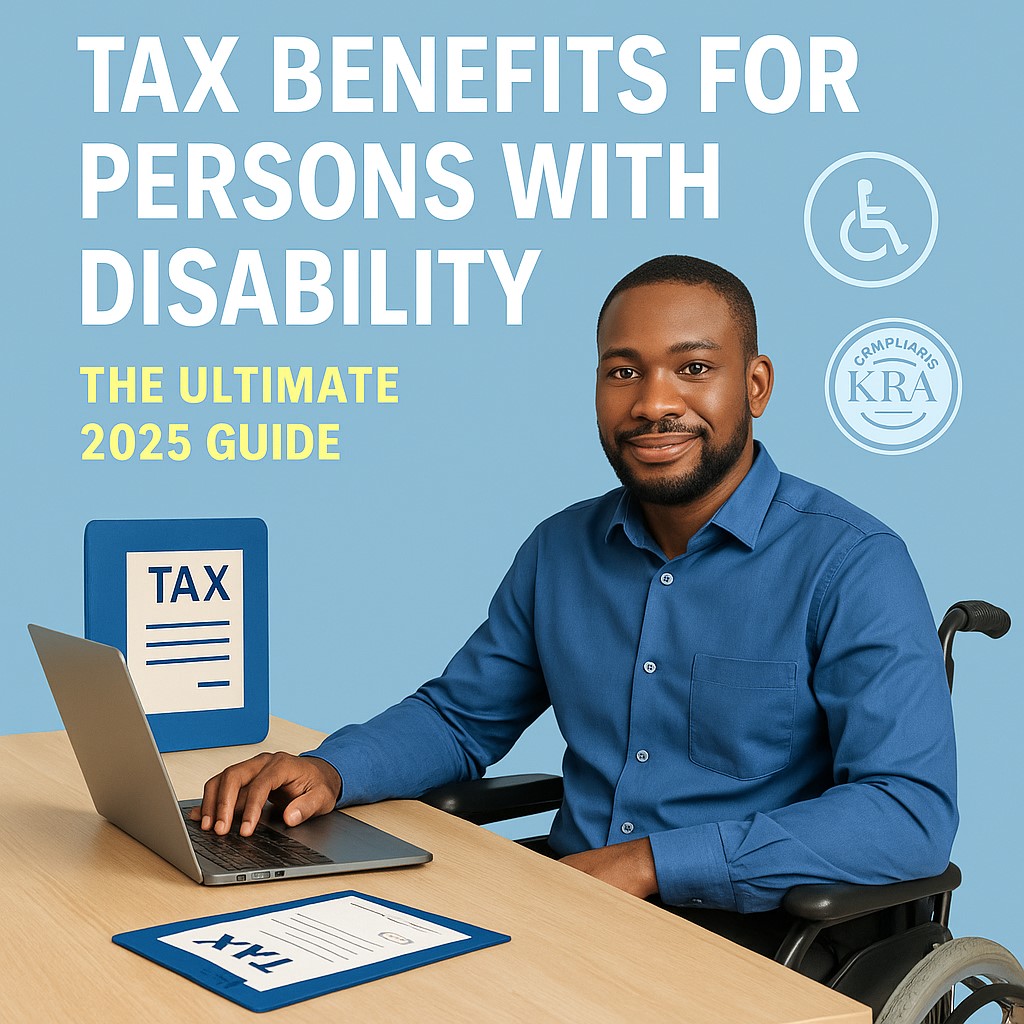Did you know that as a person living with a disability in Kenya, you may be eligible for income tax exemption of up to KES 150,000 per month? That’s not just a policy — it’s backed by law, and it could mean thousands of shillings saved annually.
But there’s a catch: you need to apply, qualify, and comply with KRA and NCPWD (National Council for Persons with Disabilities) procedures.
In this definitive 2025 guide, we explain everything — from how to apply, what documents are needed, to how to stay compliant after approval.
🧑🏽⚖️ What the Law Says About Tax Benefits for PWDs
The Kenyan Income Tax Act and Finance Acts provide that:
Registered PWDs who earn employment income, business income, or pensions are eligible for tax exemption of up to KES 150,000 per month.
This exemption applies to:
- Income Tax (PAYE)
- Withholding Tax on pensions
- Self-employment income (with declaration)
Note: You must be formally registered with the NCPWD and have an active Tax Exemption Certificate issued jointly with KRA.
✅ Who Qualifies for Tax Exemption?
You qualify if:
✔ You’re a Kenyan with a certified disability (physical, sensory, mental, or learning)
✔ You’re registered with the National Council for Persons with Disabilities (NCPWD)
✔ You earn taxable income — whether salaried, business, or pension
✔ You apply for and receive a valid tax exemption certificate
📝 Tax Benefits for PWDs in Kenya
| Benefit | Amount | Conditions |
|---|---|---|
| PAYE exemption | Up to KES 150,000/month | Applies only with a valid certificate |
| Income from business/profession | Exempt up to limit | Must file and declare |
| Pension Income | Exempt | If within limit & properly filed |
| Capital Gains Tax | Not exempt | Applies normally |
💡 Anything above KES 150,000/month is taxable under normal rules.
🧾 How to Apply for the Tax Exemption Certificate (Step-by-Step – 2025)
Step 1: Register with NCPWD
- Visit https://ncpwd.go.ke
- Create an account and submit your:
- Passport photo
- National ID
- Disability assessment form from a registered medical facility
- Supporting documents (e.g. NHIF card, proof of residence)
Step 2: Get a Disability Assessment
- Visit a Government gazetted medical board (e.g., KNH, MTRH)
- Get evaluated and obtain a Medical Assessment Report
Step 3: Apply for the Tax Exemption Certificate
Submit through the iTax portal or via NCPWD after logging in:
Required documents:
- Copy of National ID
- NCPWD Disability Card
- KRA PIN certificate
- Recent payslip or income proof
- Employer recommendation letter (if salaried)
- Bank statement
- Passport photo
- Medical assessment form
Step 4: Wait for Review
Your application is reviewed by:
- NCPWD Compliance & Benefits Department
- KRA (for tax eligibility)
This may take 30–60 days.
Step 5: Certificate Issuance
Once approved, you’ll receive:
- PWD Tax Exemption Certificate
- Valid for 3 years, renewable before expiry
🧩 How to Use the Certificate
- Salaried employees → Give to your employer. They will update PAYE to reflect the exemption.
- Self-employed → File returns via iTax and exclude exempt income (up to KES 150,000).
- Pensioners → Submit to your pension administrator.
📆 Renewal and Compliance
- Renewal is required every 3 years
- File returns annually, even if exempt
- If income exceeds KES 150K/month, tax applies to the excess
- Maintain proper medical records and income records
⚠️ Common Mistakes to Avoid
❌ Not renewing the exemption certificate
❌ Failing to submit certificate to employer (results in wrong PAYE)
❌ Assuming full exemption applies to all income
❌ Using fake or expired disability cards
❌ Ignoring annual filing obligations
🤔 FAQs
Q1: Is the exemption automatic once I get the disability card?
No. You must apply for the Tax Exemption Certificate separately.
Q2: Can self-employed persons apply?
Yes. You’ll still need to file returns and provide proof of income source.
Q3: Can I apply online?
Yes. Both NCPWD and iTax accept digital submissions in 2025.
Q4: How long does the approval take?
Between 30 and 60 working days, depending on documentation quality.
Q5: What if my income is inconsistent?
You only get exemption on the income earned — capped at KES 150K/month.
🏁 Conclusion: Know Your Rights, Save Your Income
Tax exemption is not a privilege — it’s a right for eligible Kenyans living with disability. In 2025, KRA and NCPWD have made the process more transparent and digitized than ever before.
Whether employed, retired, or self-employed — if you qualify, don’t leave this money on the table.
Stay compliant. Stay empowered. And always ask when in doubt — Ushuru.com is here to guide you.

